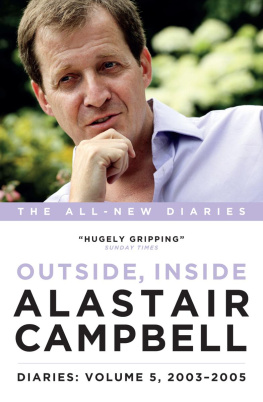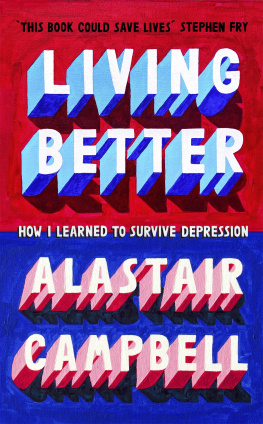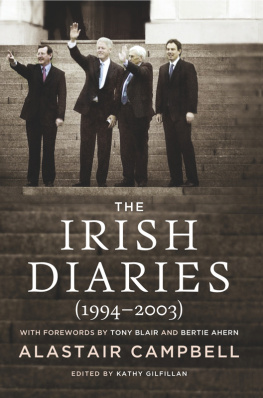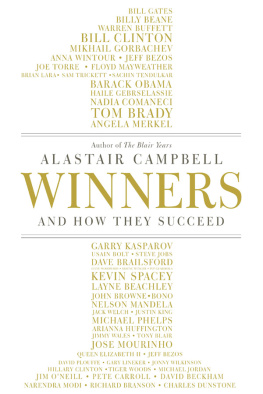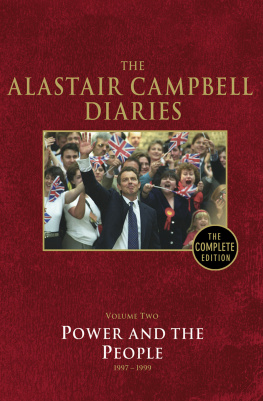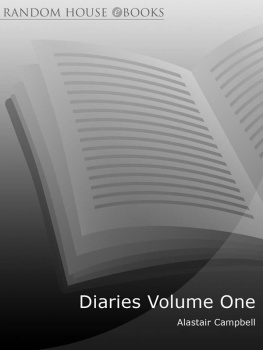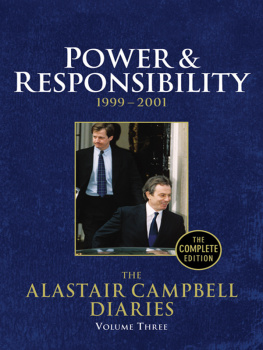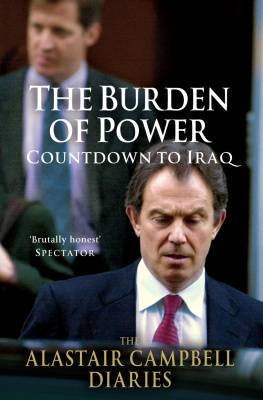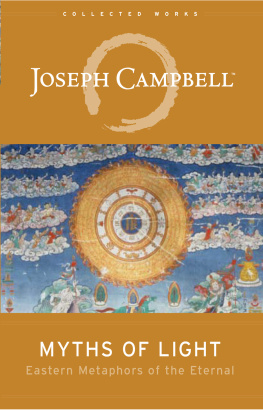As I say in the introduction, both Ed Victor, my literary agent, and Iain Dale, publisher of Biteback, were foremost in pressing me to publish my post-Downing Street diaries. Ed has been with me since long before the first word was published and as well as being a wonderful guide through the literary world, he has become a great friend and a charity partner in raising funds for research into leukaemia, a battle with which he has thankfully survived.
Iain Dale and his team make a remarkable commitment to political publishing and I have enjoyed the visits to his office with, appropriately, its superb view across the river to the Houses of Parliament. In particular I would like to thank Olivia Beattie, for her patience, professionalism and enthusiasm, and Victoria Gilder and Sam Jones.
Bill Hagerty was my editor on the previous volumes and has done the same superb, thorough job on this one. His attention to detail has often reminded me of what a terrific journalist he was when he was my boss at the Mirror Group many years ago.
Both Bill and I would like also to recall the role of two people who were centrally involved in the diaries but sadly were taken away from us far too young. Richard Stott, my former editor at the Daily Mirror, became my editor for The Blair Years but sadly died from pancreatic cancer aged just sixty-three, shortly after the book was published in July 2007. Bill gave a wonderful eulogy at his funeral and I know Richard would have been pleased, as I was, that Bill then took over. Taken away even younger was Mark Bennett, my researcher and assistant in Downing Street, who became my transcriber, researcher and assistant on the diaries and would have remained so in the publication of these further volumes. He died unexpectedly in 2014 aged just forty-four, and I wish once again to acknowledge his role and friendship here.
If you are reading this, and planning on reading the whole book, and you enjoy it, there are a few names that may be familiar to you that you will have to thank. One, if I may start with a quality political diarist name drop, is Tony Benn RIP, with whom, despite our political differences, I always got on well and with whom, latterly, I would discuss the practicalities of diary writing. The second, likewise a politician of the left and a diarist of some note, is Chris Mullin. The third is Lord Bruce Grocott Brucie to me who before taking the ermine was Tony Blairs Parliamentary Private Secretary and a great friend and support in opposition and in government. What all three have in common beyond long parliamentary experience and some though not all shared political opinions is that they nagged me to make sure that, having already published my diaries up to the point when I left Downing Street in 2003, I did not stop there. They all gave me their own version of the owe it to history thing. But Bruce had another point, which underlined the difference between contemporaneous accounts written up day after day, as mine, Tony Benns and Chris Mullins are, and the classic political memoir written towards the end of a career most of which Bruce felt should be subtitled How I was right all along. The diary, he insisted, having read mine for 19942003, tells it like it was.
Nobody has yet to accuse me of turning the diaries into a how I was right all along kind of tome. Indeed, when Tony Blairs chief of staff Jonathan Powell read those which were published in 2007, he commented that far from being self-serving, You come over as a complete lunatic.
There are a fourth and a fifth man who have been part of the persistent nagging crew: my literary agent Ed Victor, and Biteback publisher Iain Dale. Iain didnt exactly beg. But any time I was on his LBC radio show he would always take me to one side and say he really, really wanted to do my post-Downing Street diaries. Why? I left. No, you didnt. You just did it all from a different angle.
If you are detecting a slight reluctance in me, you wouldnt be wrong. Ed Victor likes to call me his most complicated client and the reasons for my reluctance are not straightforward. First off, fair to say that the publication of The Blair Years was what the media like to call a publishing sensation. Massive coverage, an instant number one bestseller and in a way defining for me personally because it became the point at which I was perhaps no longer Tony Blairs spokesman and strategist but also my own. The tour, the fallout, and the demands to talk about the book seemed to go on for ever. I was tired of talking.
The next part of the problem was a fault of my own making. It had been my idea to do extracts for the whole period, published as the first book, admitting that I was sanitising them somewhat so as to minimise any damage to Labour, still in government, and especially to Gordon Brown. But the only way I could justify doing so was to say that one day the full volumes would be published, as indeed they have been, four of them. They were not quite the publishing sensation of The Blair Years but they still got a fair bit of attention and required me to do yet more media and events, facing the same questions over and over again, during four separate periods (oh, five, because I also did The Irish Diaries, publishing everything to do with Ireland, North and South). There were times I felt trapped as a prisoner of my own past. Proud of most of what we did. But unable ever fully to move on from it.
For another complication will become clear to the reader of this and future post-Downing Street volumes, namely the tension within me, more often closer to tortured agonising, about leaving my political life behind to focus on things like my family and my mental health, while at the same time feeling a strong sense of duty to Labour, and being pressured by many, especially but not only Tony Blair, to go back in some form. The title of this volume is Outside, Inside. It was almost Never Really Left, but the chances of that being misunderstood, in the era of Jeremy Corbyn leading the Labour Party, would have been too high. Outside, Inside captures the reality, however, that for much of the time Tony Blair remained as Prime Minister, and perhaps more surprisingly when Gordon Brown succeeded him, often it felt like I was as involved as ever I had been.
Do you find your perspective changes now you are not there all the time? Tony Benn asked me one evening when we were attending a birthday dinner for his daughter Melissa, a close friend of Fiona, my partner. The answer is yes. But not always in the same way. There are times I can read over past events and relive them with the same kind of emotional intensity as existed at the time. On other occasions, there are events and incidents which clearly seemed hugely important at the time, or else why was I recording them in such detail, yet in the real world of today, I have all but forgotten them.
One sensation I have repeatedly is that of asking myself how I found the time to write down at the end of the day all the words that I did. Now that I lead a less intense kind of life, I seem less disciplined in the keeping of the diary. But when I was centrally involved, it was almost like a coping mechanism. Writing it down was a way of making sense of it when, often, living through it, it didnt seem to make sense at all.
I left. But I didnt. I left because I was tired of it, and felt I wasnt doing it as well as I used to. Yet thereafter I kept being told, both by Tony and by Gordon, that I was needed more than ever. I left also because I wanted to show Fiona, finally, that I really did understand and appreciate her desire for a different kind of life. But the reality is it took us years to get to a place where we were happy with the role I played. This volume is bad enough for the difficulties I am having in adapting. The next one is even worse. Worse too in the next one my mental health, and the realisation that I cannot sort it out on my own, that I need and finally get proper help.

